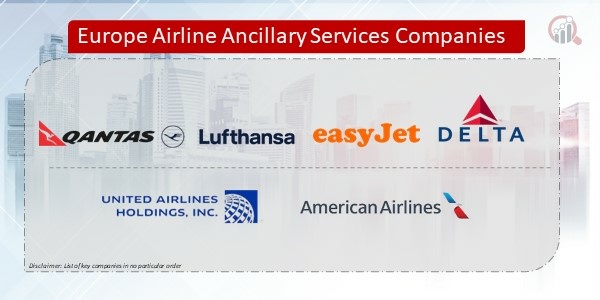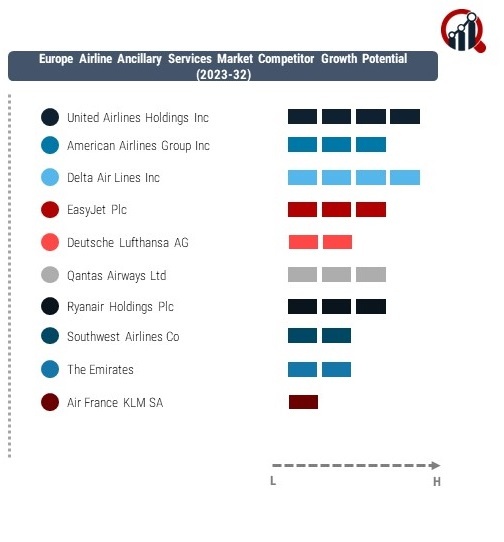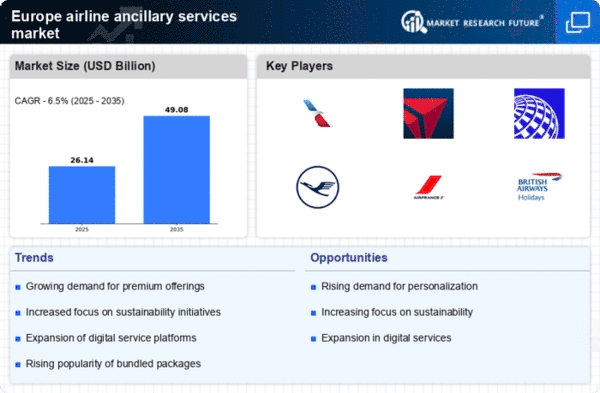Top Industry Leaders in the Europe Airline Ancillary Services Market

Strategies Adopted By Key Players Europe's airline ancillary services Market
To remain competitive in the airline ancillary services market, key players have implemented various strategies to enhance the value proposition for customers while maximizing revenue opportunities. These strategies include unbundling fares to offer a la carte pricing for ancillary services, personalizing offers based on customer preferences and travel behavior, and leveraging digital technology to streamline the booking and purchasing process. Additionally, partnerships and collaborations with third-party service providers, such as hotels, car rental companies, and travel insurance providers, enable airlines to expand their ancillary offerings and capture a larger share of the travel wallet.
Key Players in the Market:
Key Companies in the airline ancillary services market include.
- United Airlines Holdings Inc
- American Airlines Group Inc
- Delta Air Lines Inc
- EasyJet Plc
- Deutsche Lufthansa AG
- Qantas Airways Ltd
- Ryanair Holdings Plc
- Southwest Airlines Co
- The Emirates
- Air France KLM SA
Factors for Market Share Analysis:
Market share in the Europe airline ancillary services market is influenced by several factors, including the breadth and quality of ancillary offerings, brand reputation, customer satisfaction levels, and pricing competitiveness. Airlines that effectively monetize ancillary services while maintaining a positive customer experience are likely to gain market share and enhance their competitive position. Furthermore, the ability to innovate and adapt to changing consumer preferences, such as the demand for sustainable travel options or contactless payment solutions, can also impact market share dynamics.
New and Emerging Companies:
In addition to established airlines, a growing number of new and emerging companies are entering the Europe airline ancillary services market, offering innovative solutions to meet evolving customer needs and preferences. These companies often specialize in niche areas such as in-flight entertainment and connectivity, ancillary revenue optimization software, or loyalty program management. While they may face challenges in competing with larger incumbents, their agility and focus on specific market segments can enable them to carve out a niche and establish themselves as key players in the industry.
Industry News and Current Trends:
Recent developments in the Europe airline ancillary services market include the introduction of new ancillary offerings, such as premium economy seating, enhanced baggage services, and subscription-based loyalty programs. Additionally, airlines are increasingly investing in digital technology and data analytics to better understand customer behavior and personalize ancillary offers. Moreover, the impact of the COVID-19 pandemic has accelerated trends such as touchless payments, contactless check-in, and health and safety-related ancillary services, further shaping the competitive landscape of the market.
Current Company Investment Trends:
Investment in the Europe airline ancillary services market remains robust, with airlines allocating resources to enhance their ancillary offerings, improve the digital customer experience, and expand partnerships with third-party service providers. Additionally, investments in sustainability initiatives, such as carbon offset programs or eco-friendly onboard products, are gaining traction as airlines seek to align with evolving consumer preferences and regulatory requirements. Furthermore, strategic acquisitions and mergers may reshape the competitive landscape, as airlines look to consolidate market share and achieve economies of scale.
Overall Competitive Scenario:
The Europe airline ancillary services market is characterized by intense competition and ongoing innovation, as airlines strive to differentiate themselves and capture a larger share of ancillary revenue. Success in this market requires a combination of strategic pricing, personalized offerings, and seamless integration with the overall travel experience. As travellers continue to demand greater choice and flexibility, airlines must remain agile and responsive to changing market dynamics to maintain their competitive edge. In the years ahead, advancements in technology, shifting consumer preferences, and regulatory changes are expected to further shape the competitive landscape of the Europe airline ancillary services market.
Recent Development:
Qantas Airways: Introduced a subscription service offering unlimited lounge access and priority boarding for a monthly fee.
AirAsia: Partnered with ride-hailing companies to offer seamless ground transportation options for passengers.
Focus on Personalization: Several major airlines, including United Airlines and American Airlines, are exploring ways to personalize ancillary service offerings. This could involve tailoring recommendations based on past travel behaviour or offering bundles based on individual preferences.
Technology Integration: Airlines are increasingly integrating technology into their ancillary services. This includes using AI and machine learning to optimize pricing, streamline the booking process, and offer targeted advertising.


